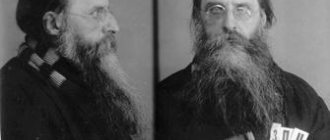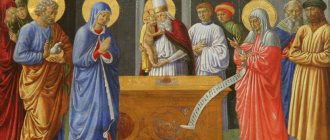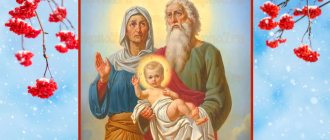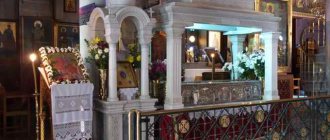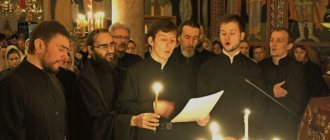On Sunday May 23, 2022 in the folk calendar - Simon the Zealot Day, Simon's Day. On May 23, the Orthodox Church venerates the Apostle Simon the Canaanite, the patron saint of treasure hunters, farmers and marriage. The saint came from the settlement of Cana of Galilee.
Simon is the son of Joseph the Betrothed and brother of Jesus Christ. It was at his wedding feast that the Savior performed his first miracle - he turned water into wine. Simon, amazed by what he saw, believed in the Lord and followed Him. For preaching the Word of God in various places (in Judea, Libya, Egypt and even in Britain), the Apostle Simon was nicknamed “zealot,” which means “zealot.” He ended his life in Abkhazia, suffering martyrdom from the pagans who crucified him on the cross.
Saint Simon, Bishop of Vladimir and Suzdal
Saint Simon, Bishop of Vladimir and Suzdal, was born in the second half of the twelfth century. He took monastic vows at the Kiev Pechersk Monastery. At the beginning of the thirteenth century, Simon was appointed abbot of the Vladimir Nativity of the Theotokos Monastery. A few years later he was installed as the first bishop of Vladimir-Suzdal. Prince Georgy Vsevolodovich of Vladir valued and revered Bishop Simon so much that he was ready to invite his friend from Kyiv, the monk Polycarp, to the Suzdal See. But Bishop Simon saw that Polycarp was being tempted by the spirit of ambition and dissuaded the prince. He wrote a letter to Polycarp himself, in which he carefully and lovingly explained the danger of possible elevation for the spiritual state of his friend. This message marked the beginning of the famous Kiev-Pechersk Patericon, a collection of moralizing and soul-helping stories of the lives of the monks and elders of the Lavra. Saint Simon died in the year one thousand two hundred and twenty-six. For a long time his ashes rested in Vladimir. Over time, the relics of the saint were transferred to the Anthony Caves of the Kiev Pechersk Lavra.
Holy Martyr Hesychius of Antioch
The holy martyr Hesychius of Antioch lived at the turn of the third and fourth centuries. He held a high position at the court of Emperor Maximian. One day the emperor issued an edict according to which Christians could not perform military service. Those who did not want to renounce their faith had to remove their military badges and move to the position of servants. As for Hesychia, the emperor decided to especially humiliate the noble nobleman. He ordered him to change from a dignitary's clothes to a coarse dress and move to the women's half of the palace, to live among the maids. For a male warrior, this was considered a special shame. A few days later, Maximian called Hesychius and asked: “Aren’t you ashamed to remain in such dishonor?” The Christian answered: “The honor that I had from you is temporary.” Then Maximian ordered the execution of Saint Hesychius.
Venerable Isidora, Fool for Christ's Sake
The Monk Isidora, a fool for Christ's sake, lived in the fourth century. She was a nun at the Taven Monastery in Egypt. Many sisters considered her crazy and treated Isidora with contempt. After all, she behaved strangely: she covered her head with a simple rag, ate the water in which she washed cauldrons and dishes. At the same time, Isidora did all the dirtiest work around the monastery. She was never angry, never insulted anyone, and was silent and obedient. One day the desert monk Pitirim had a vision. An angel of God ordered him to go to the Tavensky monastery and find a strange nun with a rag on her head. The heavenly messenger said: “She serves everyone with love and endures their contempt without complaint. Her heart and thoughts always remain with God. And you sit in solitude, but with your thoughts you go around the entire universe.” The elder did just that. Isidora was the first to fall at the feet of the monk for a blessing, but Pitirim himself bowed to the ground before her. Many sisters repented for the insults they inflicted on Isidora. But it became hard for her from such fame. The blessed one secretly disappeared from the monastery.
Folk signs on February 19
If there is a thaw outside, then wait for the early arrival of spring.
If there is fog outside, the weather will change soon.
If it rains, it will be a fruitful year.
If it snows, expect a cold summer.
If a blizzard blows, then spring will come soon.
If birds fly low, expect cold weather.
If the cow's hooves are wet, the milk will decrease.
The cow brought twins from single-haired calves - to goodness and prosperity.
If a cow gives birth to twins from mixed calves, this means bad events.
You cannot stroke the calf on the back - it will become weak.
A cow sleeps with her head to the east - she will calve during the day, and if she sleeps to the west - in the evening or at night.
Frost - spring will be warm and stormy.
Severe frosts - the summer will be hot, drought is possible.
The dawn is golden in color - the weather today will be good.
At sunrise, the horizon turned purple - indicating clear weather.
A cat or lap dog climbs onto something soft and warm, sleeps with its nose covered with its paws - it senses the imminent frost.
Mice crawl out of their shelters, run around in the snow, there are a lot of their tracks in the snow - it will get warmer, it will be cloudy, with rain, a thaw.
Cold day - March will be warm.
A thaw means poor milk yield for cows.
Blessed Taisiya of Egypt
Blessed Taisiya lived in Egypt in the fifth century. After the death of her wealthy parents, she was left an orphan. The girl was raised in the Christian faith. She led a pious life, distributed her fortune to the poor, and welcomed wandering monks into her home. But soon the temptations of worldly life turned out to be stronger and captured the girl. Having learned about this, the monks begged the ascetic John Kolov to go to Taisiya and convince her to return to a righteous life. The girl greeted the monk cheerfully. But he looked at Taisiya and began to cry. “I weep for you because you left your fiancé the Lord Jesus Christ and gave yourself to Satan,” he said. These words pierced Taisiya’s soul, her gaiety instantly disappeared. In fear, she asked if repentance was still possible. The elder replied that the Savior was always waiting for her. Taisiya decisively left her home, rejecting her former life. Together with Elder John, she hurried into the desert. All night Taisiya mourned her sins and prayed. In the morning, John woke up from a bright light coming from the sky to the place where the girl was. The monk saw angels lifting up the soul of Saint Taisia - she died that night.
Sunday, May 23, 2022, about the relaxed
The fourth Sunday after Easter is called the week of the paralytic; it is dedicated to the remembrance of the miracle of healing performed by the Savior in Jerusalem. Apostle Simon the Zealot and righteous Tabitha are saints of the 1st century, to whom we turn on this day in church-wide prayer. We also remember other holy women - Blessed Taisia and Venerable Isidora.
According to the holy fathers, the main reason for the relaxation of the soul, the paralyzed state of spirit is known - it is sin. The remedy against spiritual relaxation is prayer and patience. Relaxation of the physical body, that is, a serious illness can happen to anyone. And over the past year, this condition has often been experienced not only by older people, but also by young people.
Read more about the Christian attitude towards illness in our materials:
• If God is Love, then man is Love: Bishop Panteleimon on complex issues of mercy
• In the face of suffering. Metropolitan Anthony of Sourozh
• The experience of a cancer survivor: the story of Foma’s deputy editor-in-chief, Vladimir Gurbolikov
Kontakion of the Week of the Paralytic
My soul, O Lord, in all sorts of sins, / and weakened by placeless deeds, / raise up through Your Divine intercession, / just as You raised up the weakened one of old, / so that I call You to save // Generous, glory to Christ, Your power.
Translation: O Lord, my soul, severely weakened from all kinds of sins and from undue deeds, raise up my soul through Your divine care, just as You once raised up the paralytic, so that I, saved, cry out to You: “Glory, O Merciful Christ, to Your power!”
Troparion of the Week about the paralytic
Let the heavenly one rejoice,/ let the earthly one rejoice,/ for the Lord created a power/ with His arm,/ trampled down death upon death,/ was the firstborn of the dead;/ delivered us from the belly of hell,// and bestowed great mercy upon the world.
Holy Righteous Tabitha
Holy Righteous Tabitha (I), a virtuous and merciful woman, belonged to the Christian community in Joppa. It so happened that she became seriously ill and died. At that time, not far from Joppa, in Lydda, the holy Apostle Peter preached. Messengers were sent to him with a convincing request for help. When the apostle came to Joppa, righteous Tabitha was already dead. Kneeling down, the supreme apostle made a fervent prayer to the Lord. Then he went up to the bed and called out: “Tabitha, get up!” She rose up completely healthy (Acts 9:36).
Blessed Simon Yurievetsky
Blessed Simon Yurievetsky was born in the village of Bratsk, Kostroma province. From his youth, leaving his parents' home, he went into the dense forests near the village of Elnati and took upon himself the feat of foolishness for Christ's sake.
When the Elnat villagers, having found him in the forest, brought him to the village, the saint began to go from house to house, helping them with the most difficult work, and did not take payment.
In winter and summer, the saint walked barefoot, wearing only a linen shirt, so that his skin turned black and withered from fasting. Foolish people often beat him, but the blessed one meekly endured all insults and ridicule. Having lived in Elnati for 15 years, the saint moved to the city of Yuryevets-Povolzhsky. Here the church porches became his favorite place to stay, where he offered fervent prayers to the Lord.
For his feat of self-denial, blessed Simon received from the Lord the gifts of foresight and miracles. Thus, through his prayers, a strong fire in the city subsided, the priest Olympius was healed, and a certain city dweller Joseph was saved from drowning in the Volga.
Before his death, the blessed one came to the house of the governor Theodore Petelin, who, not knowing the exploits of the saint, in a fit of anger ordered him to be beaten. Here St. Simon became seriously ill. Having received the Holy Mysteries of Christ before his death, the blessed one rested peacefully on November 4, 1584.
Features of Orthodox worship
During each liturgy, the participants in the service sing the Creed - a prayer, behind each word of which stands the colossal spiritual experience of the Church for several centuries. The Creed is a summary of the dogmas - what the Orthodox believe. It was compiled at the first two Ecumenical Councils.
Why do we sing the Creed? The tradition of turning to God through singing has existed since Old Testament times, the apostles continued it, and church singing arose almost immediately after the emergence of Christianity. Existing for about 3,000 years, the Psalter (derived from the name of a musical instrument) is actively used in Orthodox worship. Its parts - psalms - were most often sung (and at the same time performed on musical instruments). Historically, several hymns during the liturgy could be sung by everyone in the church.
Emeritus Professor of the Moscow Theological Academy Alexey Ilyich Osipov talks about the meaning and significance of each of the members of the Creed.
Read the sequence of the Liturgy
Kiev-Brotherly Icon of the Mother of God
The appearance of the Kiev-Brotherly Icon of the Mother of God occurred in one thousand six hundred and fifty-four, in Vyshgorod, the northern suburb of Kyiv. The city was attacked by the Lithuanian prince Radziwill, the invaders plundered both houses and churches. One of the soldiers, in order to humiliate and insult the Orthodox townspeople, hit the face of the Mother of God on one of the icons with a gun. And suddenly blood appeared on the icon, as if from a wound. When Radziwill found out about this, he ordered the blasphemer to be punished and hastily left the city. At first, the icon was kept in the church of the holy passion-bearers Boris and Gleb. In one thousand six hundred and sixty-two, the Poles attacked Vyshgorod. They managed to take the shrine out of the temple and, as usual, let it go down the Dnieper, entrusting the care of it to the Lord. The river carried the icon to the shore of Kyiv Podol. There she was received with trepidation and joy and transferred to the Kiev Brotherhood Monastery. This is how the image got its name. People began to consider this icon the patroness of Kyiv. During the Soviet years, the prototype of the icon was lost. The copy of the miraculous image today resides in the Kiev Monastery of the Intercession of the Mother of God. In memory of the Kiev-Brotherly Icon, a church in the village of Gorenki, near Kiev, was consecrated in two thousand and nine.
Reading the Gospel:
Gospel of John, chapter 5, verses 1 - 15
Read excerpt
1 After this there was a feast of the Jews, and Jesus came to Jerusalem. 2 Now there is in Jerusalem at the Sheep Gate a pool, called in Hebrew Bethesda, which had five covered passages. 3 In them lay a great multitude of the sick, the blind, the lame, the withered, waiting for the movement of the water, 4 for the angel of the Lord from time to time went into the pool and troubled the water, and whoever entered first after the water was troubled was made whole, no matter what disease he was afflicted with. . 5 There was a man who had been sick for thirty-eight years. 6 When Jesus saw him lying down and knew that he had been lying there for a long time, he said to him, “Do you want to be healthy?” 7 The sick man answered Him: Yes, Lord; but I do not have a person who would lower me into the pool when the water is troubled; when I arrive, another has already descended before me. 8 Jesus saith unto him, Arise, take up thy mat, and walk. 9 And he immediately became well, and took up his bed and went. It was on the Sabbath day. 10 Therefore the Jews said to the man who was healed, “Today is the Sabbath; You shouldn't take the bed. 11 He answered them: He who healed me said to me, Take up your bed and walk. 12 They asked him, “Who is the man who said to you, Take up your bed and walk?” 13 But he who was healed did not know who He was, for Jesus was hidden among the people that were in that place. 14 Then Jesus met him in the temple and said to him, “Behold, you are healed; Don’t sin anymore, lest something worse happen to you. 15 The man went and announced to the Jews that the one who healed him was Jesus.
Collapse
Bishop Feoktist (Igumnov) comments
Gospel of Matthew, chapter 13, verses 54 - 58
Read excerpt
54 And when he came to his own country, he taught them in their synagogue, so that they were amazed and said, “Where does he get such wisdom and power?” 55 Is not this the son of carpenters? Is not His mother called Mary, and His brothers Jacob and Joses and Simon and Judas? 56 And are not His sisters all among us? Where did He get all this from? 57 And they were offended because of Him. Jesus said to them: A prophet is not without honor except in his own country and in his own house. 58 And he did not perform many miracles there because of their unbelief.
Collapse
Priest Dmitry (Baritsky) comments


